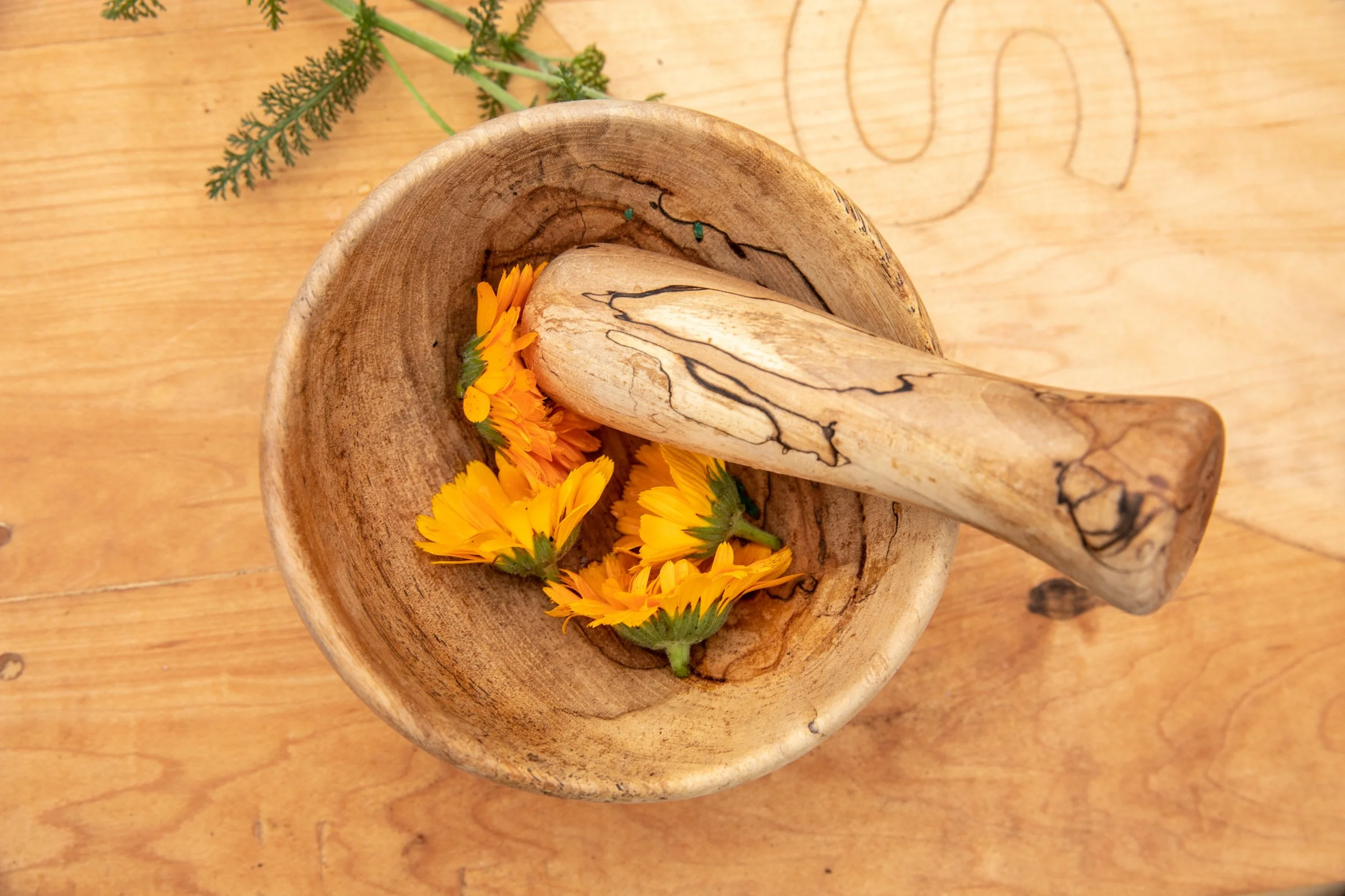Care & Plant Medicine from The Abolitionist’s Apothecary
The Abolitionist’s Apothecary+ is a traveling, community-rooted strategy and social practice dedicated to abolition, healthcare sovereignty, and collective healing. An outgrowth of Solitary Gardens, the Apothecary cultivates relationships between people, plants, and place—offering a living alternative to systems of punishment and disposability. Based at The John Thompson Legacy Center for Abolition & Beyond in New Orleans, it is grounded in abolitionist pedagogy and practice, operating at the intersections of land, liberation, and care.
The plant medicine shared through the Apothecary is grown and prepared in collaboration with currently and formerly incarcerated individuals across the country. In doing so, it becomes more than herbal remedy—it becomes ritual, resistance, and reparation. Each formula is shaped by voices and hands historically silenced by incarceration, offering participants a powerful means to reconnect with community, reclaim agency, and heal the very social fabric they are often accused of harming.
By honoring the wisdom of plants and the people who tend them, The Abolitionist’s Apothecary+ challenges dominant narratives of criminality, restitution, and redemption. It invites us to reimagine justice through the lens of care, complexity, and reciprocity—where healing is not conditional, but collective.
Dive in here.
Why the Weeds?!
Those of us working at Freedom To Grow believe that our culture’s addiction to efficiency narrows how we see ourselves, each other, and the world around us. This obsession with order and productivity feeds unconscious bias, racism, sexism, and harm. Even in ecology, the way plants are classified reflects these same reductive logics—classist, hierarchical systems that mirror broader social injustices. Take how we speak about weeds: labeled invasive, unwanted, disposable. That language carries over to how we treat people who have been criminalized and incarcerated—ignored, dismissed, or erased. The pesticides of society are prisons, policing, surveillance—the tools that uphold what Isabel Wilkerson names as the American caste system, keeping human value stratified for the sake of control and capital. As abolitionists, we reject these simplifications.
We believe in complexity, contradiction, and transformation. As part of this commitment our apothecary highlights the medicine so-called weeds offer us. Weeds show us what survival looks like under hostile conditions—they root deep, grow wild, and regenerate what systems try to destroy. From these so-called invasives,like so many of our incarcerated Beloveds, we learn to imagine new ways of living, adapting, and thriving in the cracks of empire.
Solitary Gardener Spotlight
Each year, through our collaboration with Planting Justice we will uplift one of our Solitary Gardeners. The first spotlight is Obie Weathers III, who as a teen was arrested and sentenced to death, has spent the last 24 years in solitary on death row. Using found material and media acquired anyway he can, his work emerges from a dim hole in American culture, arriving with visions of what it is like to be poor, Black, hopeful and sentenced to death in the 21st century. His creative practice extends to mentorship of young people and collaborations with university professors by providing insight gleamed from personal experience to help prepare a new generation of concerned citizens support struggling youth and interrupt systems of youth disposability. The existential, political and spiritual themes of his work are often filtered through the Buddhist and yogic practices which have helped heal and sustain him through decades of isolation.
“I’ve been thinking of aloe vera for the garden. I like its medicinal uses and its ability to survive. I like how it holds water/moisture for us. Symbolically we need those who keep us lubricated mentally, emotionally, spiritually, intellectually... so that we don’t get rusted (stuck) and useless to those around us. I remember aloe around my house as a kid. They didn’t seem to need a lot of attention for their well-being and they did scream “look at me!”. They were really reserved but were always there when I burnt myself somehow and mama used it to soothe me.”
Learn more about Obie’s Garden.
**All monies generated from the Solitary Gardener Spotlight will go towards Obie’s living expenses. You can donate directly here.
Disclaimer
The plant medicines and herbal materials shared by Freedom To Grow through the Abolitionist’s Apothecary, are part of a community-based art project rooted in collective healing. We are not medical professionals, and nothing offered is intended to diagnose, treat, or cure any condition.
These offerings are for educational and cultural purposes only. Use of plant medicine should be approached with care, self-education, and, when needed, consultation with a healthcare provider.
By engaging with our work, you acknowledge that Freedom To Grow is a nonprofit and artistic initiative, and accept full responsibility for your choices. We share this knowledge in the spirit of collaboration, not prescription.


